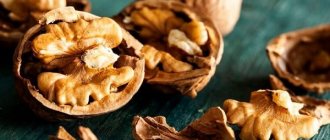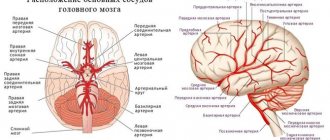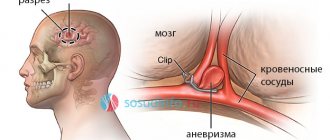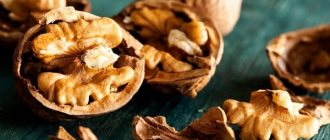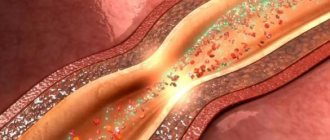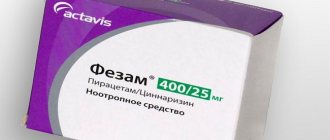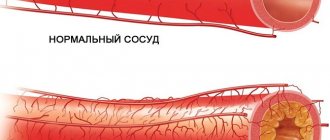Cognac is classified as a strong alcoholic drink; it is obtained by distilling young wine, which is then aged in oak barrels. An aromatic drink of a noble hue with a strength of 40-42% vol. is a high-calorie product, its nutritional value is 240 kcal/100 g. Cognac does have some beneficial properties, but, like any alcoholic drink, it has a detrimental effect on health and causes addiction when consumed regularly in large quantities.
Content:
- The influence of alcohol on indicators
- For hypertension
- At low pressure
- Related factors
- Possible consequences
- Compatibility of alcohol and antihypertensive drugs
- How to stop a rise
The most frequently asked questions to narcologists are whether alcohol increases or decreases blood pressure, and how alcohol affects existing hypertension or hypotension. The widespread belief that under the influence of ethanol blood vessels dilate, helping to normalize blood pressure, is incorrect. Conducted research and collection of statistical data indicate that in most cases of alcohol dependence, hypertension is diagnosed. A trend is also observed in people who regularly drink alcoholic beverages.
Cognac - benefits and harms
Moderate consumption of this strong drink can benefit your well-being, but you should understand that the properties of the product directly depend on its quality.
- Cognac has a vasodilating effect, thereby lowering blood pressure, can relieve headaches, and reduces the load on the heart.
- A glass of cognac before meals stimulates the appetite and improves the process of digesting food.
- Warmed cognac can be used to treat coughs and other cold symptoms.
- The drink lifts your mood, has a relaxing effect, relieves stress, and stabilizes your psycho-emotional state.
But we must understand that the harm of cognac to health is undeniable. Any alcoholic beverages, when consumed regularly, negatively affect the functioning of internal organs, a person’s appearance, and their mental abilities. Cognac and the liver without pathologies are a rare occurrence; this organ suffers when drinking alcohol in any form. Cognac is not recommended for people who are overweight, diabetics, with regular surges in blood pressure, with stable low blood pressure, with pathologies of the genitourinary system, or with an unstable emotional state.
The influence of alcohol on indicators
To understand the issue, consider the effect of ethanol on blood vessels. In a healthy person, small doses lead to a slight decrease in blood pressure. The effect is due to the toxic effect on the neurons of the vasomotor center of the medulla oblongata, which is responsible for the tone of arteries, veins and capillaries. Temporary relaxation of the vascular walls occurs, thereby increasing the internal lumen. The action is felt as a general relaxation, a spreading of warmth throughout the body.
When drinking a large volume, the opposite reaction develops, causing vasospasm. The vascular lumen sharply narrows, blood flow slows down, accumulating in certain zones, and a sharp increase in indicators is observed. An addict or drinker with a history of hypertension may develop a hypertensive crisis. With systematic abuse, unexpected changes are likely.
For hypertension
In case of illness, alcohol causes jumps up to critical levels. The mechanism is as follows: relaxation is followed by a sharp spasm and the release of stress hormones into the blood. The heart rate accelerates, the organ pumps blood faster, thereby raising blood pressure.
Frequent consumption, especially in large quantities, is strictly contraindicated for hypertensive patients. Changes in blood flow caused by periodic relaxation and spasms worsen the condition of the body. Lack of oxygen and nutrients has a detrimental effect on health.
This is especially noticeable in people suffering from alcoholism, when there is a lack of vitamins and minerals. Not only does the risk of cardiovascular pathologies increase, but also premature wear and tear of the entire system.
How to quickly restore your brain after alcohol?
Full recovery of the brain after alcohol is a long process. To achieve results, you need to give up alcohol, eat right, lead a healthy lifestyle, and maintain physical activity.
Additionally, you can perform sets of exercises to restore brain activity, improve memory, attention, and thinking.
If the next day after drinking a large amount of alcohol you need to drive, go to work or study, you can relieve the hangover. For this purpose, pharmacies sell remedies that eliminate ailments. But the amount of alcohol in the blood does not decrease! Therefore, any test will show the truth.
At home, you can drink activated charcoal to cleanse the stomach of toxins, or ibuprofen to relieve headaches. To recover faster, you should drink a lot of sparkling water with lemon juice and green tea. Diuretics and diuretics will help remove alcohol.
At low pressure
With hypotension, the walls of blood vessels are dilated and are in a state of decreased tone. Under the influence of small doses of ethyl alcohol, the muscles of the vascular walls relax even more, thereby reducing the pressure of blood flow. The blood supply to the extremities and brain deteriorates, and the ensuing hypoxia causes drowsiness. It is for this reason that a drunk person feels numbness in his legs and dizziness.
Regular drinking leads to increased pressure and even greater stretching of the walls. The accumulation of cholesterol and changes in blood composition provoke the formation of blood clots and atherosclerotic plaques. 5-6 hours after a heavy libation, dehydration of the body occurs, hemoconcentration of the blood increases, that is, its thickening. In this regard, the formation of blood clots and the complete deterioration of blood supply, especially small capillaries, increases.
How to drink cognac correctly?
In order for this noble drink to be beneficial, you must adhere to strict rules for its use. They drink cognac:
- in an amount not exceeding 50 g (depending on body weight - for thin people the norm is reduced to 30 g);
- do not snack on fatty and salty dishes (which retain fluid and cause a rise in blood pressure);
- during a calm period, that is, when exacerbations of any chronic diseases are relieved.
Cognac contains tannins and tannins , which help fight inflammation and strengthen the immune system. In minimal doses, it has a positive effect on blood vessels, preventing the appearance of cholesterol plaques. In addition, cognac promotes the absorption of vitamin C by the body.
But all these healing qualities will be wasted if you “add” cognac to the 50 g you’ve already drunk. Moreover, in this case you should expect a deterioration in your health: in addition to pressure surges, the “bouquet” will include the consequences of alcohol intoxication. What benefits can we talk about here!
Related factors
In addition to the dosage, the patient’s age, existing diseases and even the type of drink are affected. Under the age of 40, changes are practically not felt even after prolonged use. Over 40 and up to 55 years, 67% of people experience symptoms of blood pressure surges. In old age, almost every person who drinks has problems with the functioning of the cardiovascular system.
Existing pathologies of the heart and blood vessels, as well as the kidneys and endocrine system, greatly increase the risk of hypertension with systematic use and the presence of chronic alcoholism . Also, aggravating factors are considered to be a tendency to blood clots, elevated cholesterol levels or diabetes mellitus, intracranial hypertension.
There is an opinion that cognac relieves spasms and normalizes blood flow, but the temporary effect has already been written above. Taking wine in therapeutic doses is also not justified. Even the consumption of a small amount does not go unnoticed and causes damage to health.
It is better not to drink alcohol if you are obese and prone to swelling. This will only make the condition worse.
Traditional medicinal recipes
Although cognac itself is not the best remedy for strengthening blood vessels, it is an excellent basis for folk recipes. The most effective among them are:
- cognac tincture with cranberries;
- tea with cognac and cinnamon.
Cranberry tincture
Cranberries are good for the heart and blood vessels, as they contain a large amount of vitamin C and phenolic antioxidants, which lower cholesterol levels and strengthen blood vessels. Prepare a cranberry cleanser as follows:
- Rinse 600 grams of cranberries under running water, place on a paper towel and mash a little (covering with another towel on top);
- then transfer it to a jar, cover the top with gauze and leave it like that for a day;
- Next - transfer the berries to an enamel bowl, add about 1 - 1.5 glasses of water and heat in a water bath until boiling;
- after cooling, strain through cheesecloth;
- add 500 milliliters of cognac to the resulting broth.
Take 30 milliliters before dinner . The course is at least 2 weeks.
Also watch this recipe video:
The remaining berries should not be thrown away. It is better to pour 1 liter of vodka over them and let them brew for 1 week in the cellar or in the refrigerator. The resulting tincture is no worse than expensive wine.
Adding to tea
It is considered the best tonic for blood vessels, and also normalizes blood pressure. Easy to prepare:
- brew your usual tea (you can also use green or fruit tea);
- add ¼ teaspoon of cinnamon to 1 glass, 2 teaspoons of cognac;
- let steep for 10 minutes and drink warm.
Drink no more than once a day to prevent cardiovascular diseases.
The combination of cinnamon and honey is also extremely beneficial for the cardiovascular system.
Possible consequences
Among the heart pathologies caused by systematic abuse, the most common are:
- chronic heart failure;
- alcoholic cardiomyopathy;
- organic and functional myocardial lesions, ischemic heart disease;
- arrhythmias.
The danger is posed by changes caused by prolonged binge drinking or a state of abstinence, during which severe complications develop.
- Ischemic strokes, accompanied by impaired cerebral circulation, leading to partial paralysis and disability.
- Arrhythmias, manifested either by a rapid heartbeat or a slowdown.
- Hypertensive or hypotensive crises are cases of sustained decrease or increase, tolerant to the action of drugs.
- Myocardial infarction, causing partial impairment or loss of pumping function.
- Transient ischemic attacks are cerebral circulatory disorders that cause neurological abnormalities: speech disorders, loss of memory or motor functions, paresis.
Alcohol increases and sometimes decreases blood pressure. In addition, it neutralizes the effects of drugs to normalize blood pressure. Because of this, during horse racing, the attack cannot be controlled with medication.
Compatibility of alcohol and antihypertensive drugs
If you are diagnosed with hypertension and take daily medications, you should stop drinking strong drinks, since ethanol reduces the effectiveness of the drugs. On rare occasions you can drink a glass of good wine.
The use of most antihypertensive drugs during or after drinking any alcoholic beverages is also prohibited. A proven medicine, when interacting with ethyl alcohol, can give an unexpected side reaction.
Carefully read the instructions for the drug for interactions, since taking certain medications together is potentially dangerous to health and life.
A little about the drink itself
Cognac is a very popular strong drink. It is consumed both at family celebrations and at corporate parties, and is given as a gift to bosses, friends and relatives.
This legendary drink is made from aged white wines. It is valued for its exquisite taste, which is combined with strength. It has long been noted that this type of alcohol improves not only mood, but also well-being. Small doses of cognac can stabilize blood pressure. If you drink 50-70 grams, you will feel your body relax and a pleasant warmth spread throughout your body.
If you drink a few glasses of cognac in company, you can reduce tension, create an atmosphere of comfort, and make the holiday soulful. In this case, this brandy has a calming effect. Coming from the cold, it’s enough to sip a little strong drink to warm up and turn on the body’s protective properties.
How to stop high blood pressure during abstinence
When drinking strong alcohol, sharp changes are characteristic. What to do when alcohol lowers or increases blood pressure during withdrawal:
- measure indicators;
- if a jump of more than 20% of the individual norm is detected, call emergency medical help;
- if the jump is less than 20%, you need to drink more fluid to prevent dehydration.
Taking sorbents - polysorb, enterosgel, activated carbon will help remove toxins faster.
If you have existing diseases, you should stop drinking alcohol. A timely visit to a narcologist will help with this.
How to properly lower blood pressure with alcohol
To ensure that cognac brings only benefits, consider the following recommendations:
- Remember that this drink is often counterfeited; do not buy too cheap and low-quality cognac.
- Even expensive, high-quality cognac in large doses is harmful. It, just like a cheap one, can provoke a jump in blood pressure.
- Never combine hypertension medications with alcohol. It will enhance their effect. Alcohol and drugs are generally incompatible.
- It is popularly believed that light varieties of cognac lower blood pressure, while dark varieties increase it. Light does indeed contain less tannin and acids, but it is not a fact that it will work specifically to lower blood pressure.
- Everything salty can increase blood pressure, so you should not take salty foods with alcohol.
- Cognac should not be taken as a cure for blood pressure. This is just a side effect that lasts for a short time. And then, in order to achieve a reduction, you should strictly know your minimum dose and not exceed it. If you use this drink too often for “medicinal” purposes, you may develop a stable dependence on it - this is a direct path to alcoholism.
Literature:
- Risk factors for arterial hypertension / V. R. Weber, B. B. Fishman; Feder. education agency, Novgorod. state University named after Yaroslav the Wise, Novgorod. scientific Center of the Northwestern Branch of the Russian Academy of Medical Sciences. — St. Petersburg: Novgor. state univ., 2005 (St. Petersburg: Printing house “Science”). — 207 p.
- Hypertension. High blood pressure disease [Electronic resource]: blood pressure control, non-drug methods for treating hypertension, lowering blood pressure with the DASH diet: 12+ / P. A. Fadeev. - Moscow: Eksmo, 2014. - 430 p.
- Alcohol and arterial hypertension / Ostroumova Olga Dmitrievna, Saperova Ekaterina Vladimirovna / 2014 / Rational pharmacotherapy in cardiology.
- Changes in the daily blood pressure profile under the influence of systematic alcohol consumption / Zhirov I.V., Ogurtsov P.P., Shelepin A.A. / 2000 / Bulletin of the Peoples' Friendship University of Russia. Series: Medicine.


